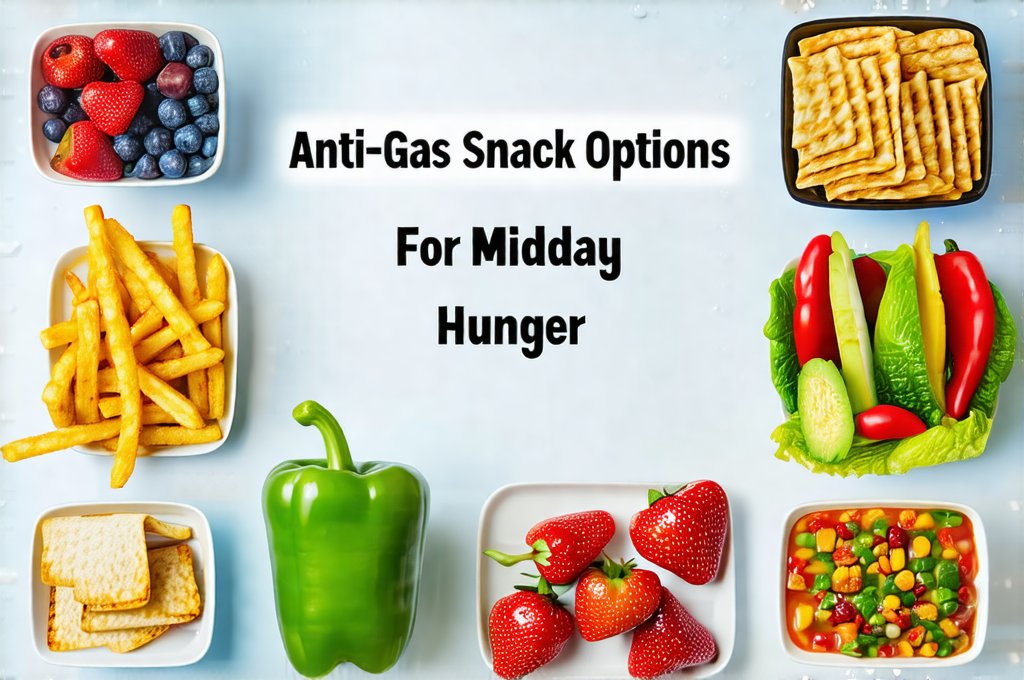Experiencing midday hunger is incredibly common, but for individuals prone to gas and bloating, choosing the right snack can be the difference between a productive afternoon and an uncomfortable one. Many seemingly harmless foods are notorious gas producers, leaving people feeling self-conscious and distracted. The challenge isn’t necessarily eliminating snacks altogether – it’s about making informed choices that support digestive comfort while satisfying hunger pangs. This article will explore practical, delicious options to quell midday cravings without the unwanted side effects of excessive gas, focusing on foods easy to digest and gentle on the gut.
The key to minimizing gas from snacking lies in understanding why certain foods cause it. Often, it’s due to specific carbohydrates called FODMAPs (Fermentable Oligosaccharides, Disaccharides, Monosaccharides, And Polyols) that aren’t fully absorbed by the small intestine and are then fermented by bacteria in the large intestine, producing gas as a byproduct. However, even beyond FODMAPs, factors like fiber content, fat levels, and individual sensitivities all play a role. We’ll move past simply identifying problematic foods to discover satisfying alternatives that can keep you energized and comfortable throughout your day. This isn’t about restrictive dieting; it’s about mindful snacking for better digestive health.
Gentle & Digestible Options
Navigating snack choices when gas is a concern requires focusing on foods that are naturally easy to digest. These are generally lower in FODMAPs, moderate in fiber (avoiding extremes), and don’t contain ingredients known to trigger fermentation. Think simple, whole foods prepared in uncomplicated ways. Often, the fewer ingredients, the better – this makes it easier to pinpoint potential triggers if issues arise.
One excellent starting point is fruit. However, not all fruits are created equal! Lower-FODMAP options include bananas (ripe but not overripe), blueberries, strawberries, cantaloupe and honeydew melon. Apples and pears, while healthy, can be problematic for some due to their fructose content. Similarly, stone fruits like peaches and plums should be consumed in moderation. Pairing fruit with a source of protein or healthy fat can also slow down digestion and reduce gas production.
Beyond fruit, there are plenty of other satisfying options. Plain yogurt (Greek yogurt is excellent due to its higher protein content) paired with berries is a great choice. Rice cakes topped with avocado and a sprinkle of sea salt provide healthy fats and fiber without being overly stimulating to the digestive system. A small handful of almonds or walnuts can also offer a boost of energy and nutrients, but portion control is crucial as excessive nut consumption can lead to discomfort for some individuals. Prioritizing simple preparations and mindful portions are essential. If you’re unsure if you’re mistaking hunger for reaction, it’s important to check in with your body.
Building Anti-Gas Snack Combinations
The real power in anti-gas snacking comes from combining different food groups strategically. This helps balance macronutrients – carbohydrates, proteins, and fats – which aids digestion and minimizes bloating. For instance, simply eating a banana might cause a quicker spike in blood sugar and potentially more gas than pairing it with a tablespoon of almond butter. The fat in the almond butter slows down digestion, creating a more stable metabolic response and reducing fermentation in the gut.
Consider these combinations: – A small portion of cooked oatmeal (made with water, not milk if lactose intolerant) topped with blueberries and a sprinkle of chia seeds. – Rice cakes with avocado and smoked salmon. – The healthy fats from avocado and salmon are easily digestible. – Plain Greek yogurt with strawberries and a few walnuts. – A hard-boiled egg with a side of cantaloupe. – Protein and low-FODMAP fruit offer sustained energy.
Remember, individual tolerance varies significantly. What works for one person may not work for another. Pay attention to your body’s signals and adjust accordingly. Keeping a food diary can be incredibly helpful in identifying specific triggers and building a snack plan that suits your needs. Consistency and self-awareness are key. For patients with more serious GI concerns, understanding palliative care options can be very beneficial.
Identifying Your Personal Triggers
Gas production is highly individualized. While general guidelines exist, the best way to determine what causes your gas is through careful observation and potentially, elimination diets (done under guidance from a healthcare professional). Start by keeping a detailed food diary for at least a week, noting everything you eat and drink, as well as any symptoms experienced – including bloating, gas, abdominal pain, or changes in bowel habits.
- Record everything consumed, even seemingly insignificant snacks or drinks.
- Note the timing of your symptoms relative to food intake. Is there a consistent delay?
- Look for patterns. Do certain foods consistently trigger discomfort? Common culprits include beans, lentils, cruciferous vegetables (broccoli, cauliflower, cabbage), carbonated beverages, and artificial sweeteners.
If you suspect specific foods are causing issues, consider temporarily eliminating them from your diet for a few weeks to see if your symptoms improve. Then, reintroduce them one at a time, carefully monitoring for any reactions. This process can help pinpoint sensitivities that might otherwise go unnoticed. Don’t attempt restrictive diets without consulting a healthcare professional. It’s also important to consider screening for colorectal cancer as part of your overall digestive health plan.
Portion Control & Eating Habits
Even the most gut-friendly foods can cause gas if consumed in excessive quantities. Portion control is paramount when managing digestive discomfort. Snacking should be about bridging the gap between meals, not replacing them entirely. Small, frequent snacks are often better tolerated than large, infrequent ones.
Beyond quantity, how you eat also matters. Eating too quickly without properly chewing food can overwhelm your digestive system and lead to increased gas production. Take your time, savor each bite, and chew thoroughly before swallowing. Avoid gulping down fluids with your meals, as this can dilute digestive enzymes and hinder proper breakdown of food. Mindful eating practices are crucial for optimal digestion. You might also find dairy-free options helpful if you suspect lactose intolerance is contributing to your discomfort.
Consider these additional tips: – Stay hydrated throughout the day by drinking plenty of water. – Proper hydration aids digestion. – Engage in regular physical activity. – Exercise promotes gut motility. – Manage stress levels. – Stress can negatively impact digestive function.
Alternatives to Common Gas-Producing Snacks
Many popular snacks are known gas producers. Replacing these with gentler options is a simple way to improve digestive comfort. Instead of: – Bean chips or dips, opt for rice cakes with avocado. – Carbonated beverages, choose still water infused with fruit slices. – Lemon and cucumber are excellent choices. – Cruciferous vegetables raw (like broccoli florets), consider small portions of cooked spinach. – High-fructose fruits like apples and pears in large quantities, enjoy a banana or blueberries instead. – Dairy products if lactose intolerant, switch to plant-based alternatives like almond yogurt.
The goal isn’t deprivation; it’s about making informed swaps that prioritize digestive health without sacrificing enjoyment. By focusing on simple, whole foods, practicing mindful eating habits, and identifying your personal triggers, you can enjoy satisfying midday snacks without the discomfort of excessive gas. Remember to listen to your body and adjust your snack choices accordingly – your gut will thank you. If you are dealing with GI cancer, it’s also worth looking into advancements in treatment options. And finally, the benefits of cooking at home can provide even more control over your diet and digestive health.


















